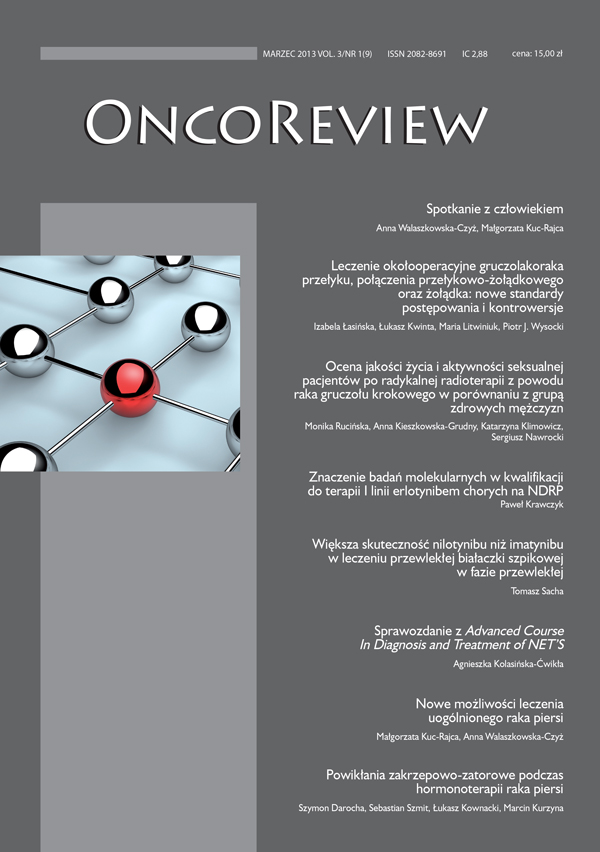Nowe możliwości leczenia uogólnionego raka piersi Artykuł przeglądowy
##plugins.themes.bootstrap3.article.main##
Abstrakt
Mimo udoskonalania metod badań przesiewowych, wczesnego wykrywania raka piersi i nowych terapii rokowanie w raku piersi pozostaje złe. Zaawansowany, uogólniony rak piersi jest chorobą przewlekłą, nieuleczalną. Podstawową metodą leczenia systemowego nowotworów dodatnich receptorowo jest hormonoterapia. Do niedawna w przypadku oporności metodą z wyboru pozostawała chemioterapia, obecnie możliwe jest zastosowanie skojarzenia leczenia hormonalnego z leczeniem celowanym ewerolimusem – inhibitorem mTOR. W rakach z nadekspresją receptora HER2 rokowanie pacjentek zmieniło wprowadzenie do leczenia trastuzumabu. Mimo dostępności wielu metod leczenia nadal poszukuje się nowych, które poprawią wyniki leczenia.
Pobrania
##plugins.themes.bootstrap3.article.details##

Utwór dostępny jest na licencji Creative Commons Uznanie autorstwa – Użycie niekomercyjne 4.0 Międzynarodowe.
Copyright: © Medical Education sp. z o.o. This is an Open Access article distributed under the terms of the Attribution-NonCommercial 4.0 International (CC BY-NC 4.0). License (https://creativecommons.org/licenses/by-nc/4.0/), allowing third parties to copy and redistribute the material in any medium or format and to remix, transform, and build upon the material, provided the original work is properly cited and states its license.
Address reprint requests to: Medical Education, Marcin Kuźma (marcin.kuzma@mededu.pl)
Bibliografia
2. Andre F., Slimane K., Bachelot T. et al.: Breast cancer with Synchronous metastases: trends in survival during a 14-Year Period. J. Clin. Oncol. 2004; 22: 3302-8.
3. Sundquist M., Eriksson Z., Tejler G. et al.: Trends in survival in metastatic breast cancer. Eur. J. Cancer 2010; 8(3): 191 (abstract 453).
4. Goldhirsch A., Wood W.C., Coates A.S. et al.: Strategies for subtypes-dealing with the diversity of breast cancer: highlights of the St Gallen International Expert Consensus on the Primary Therapy of Early Breast Cancer 2011. Ann. Oncol. 2011; 22 (8): 1736-47.
5. Harris L., Fritsche H., Mennel R. et al.: American Society of clinical oncology 2007 update of recommendations for the use the tumor markers in breast cancer. J. Clin. Oncol. 2007; 25(33): 5287-312.
6. Slamon D.J., Clark G.M., Wong S.G.: Human breast cancer: correlation of relapse and survival with amplification of the HER-2/neu oncogene. Science 1987; 235: 177-82.
7. Dawood S., Broglio K., Buzdar A.U.: Prognosis of women with metastatic breast cancer by HER2 status and trastuzumab treatment: an institutionalbased review. J. Clin. Oncol. 2010; 28: 92-8.
8. Verma S., Miles D., Gianni L. et al.: Trastuzumab Emtansine for HER2-Positive Advanced Breast Cancer. N. Engl. J. Med. 2012; 5: 1-9.
9. Baselga J., Gelman K.A., Verma S. et al.: Phase II of pertuzumab and trastuzumab in patients with human epidermal growth factor receptor 2-positive metastatic breast cancer that progressed during prior trastuzumab therapy. J. Clin. Oncol. 2012; 28(7): 1138-44.
10. Baselga J., Cortés J., Kim S. et al.: Pertuzumab plus Trastuzumab plus Docetaxel for Metastatic Breast Cancer. N. Engl. J. Med. 2011; 8: 1-11.
11. Verma S., Miles D., Gianni L. et al.: Trastuzumab Emtasine for HER2-Positive Advanced Breast Cancer. N. Engl. J. Med. 2012; 367: 1783-91.

